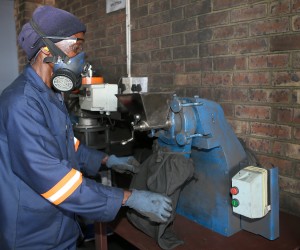Umzamo Analytical Services (UAS) CEO, Audrey Ndlovu, shares her experience with developing a company culture of inclusion and participation, describes why investing in their employees has helped the company to maintain a competitive advantage and explains why others should do the same.
Human resources, says UAS CEO, Audrey Ndlovu, are without doubt the most important and greatest assets to any organisation. The rationale behind strategic resourcing at UAS is not to forget that it is people who implement the organisations’ strategies. In a business environment immensely characterised by dynamism and increased competition, UAS does not take for granted the input that comes from the most important of assets, human resources. “Ultimately, UAS symbolizes itself as employee oriented and we try to strategically align our goals to embrace employees – viewing them as the magic potion to addressing the challenges brought on by economic hardships. Accordingly, as a company we value our employees as our most important assets,” she explains.
“When describing the company culture that has been carefully fostered at UAS over time, that words that first come to mind are team work, integrity, trust and loyalty. I would say that the corporate reputation that we have built for quality and innovation is a result of how we work together,” says Ndlovu.
When describing the various initiatives that they have put in place in order to encourage, support and develop their staff, Ndlovu says: “As a company we value and are well aware of the empowering influence that further knowledge has on our staff. This is why we have initiatives in place that include on-the-job training and off-the-job training in the form of bursaries for further education.”
She describes on-the-job training as consisting of systematic and planned instruction activities usually executed by UAS’ more senior and experienced technicians to promote learning. Off-the-job training includes enrolling staff in relevant courses with nationally recognized institutions such as NOSA, SANAS, the OHS Academy and many more.
Ndlovu firmly believes that the way a company treats an employee has a direct effect on the experience that clients will have with your company. “We want our clients to not only perceive us as the best in the industry but also to be able to clearly distinguish us from the rest. As such our corporate culture, recruitment policies and the frequent and strategic training of our staff all play a pivotal role in the way our clients perceive us. Because of the calibre of employees we attract and are able to retain, our services are of the highest quality.”
Ndlovu says that this approach is going to be pivotal for ensuring the viability of companies both within and peripheral to the mining industry in the near future – and that is why UAS has adapted its recruitment policies accordingly. “Several experts have warned that millennials are changing the face of the workplace. The young people of this generation have infinitely more opportunities than their parents had and they realize they don’t have to put up with miserable workplaces. They are interested in working for companies that express and live by a set of positive core values.”
People resourcing, says Ndlovu, is an integral part of UAS that focuses on the recruitment and selection of individuals from the labour market as well as the management of their performance and potential while employed by UAS. “We also recruit and hire in-service students and graduates who show the zeal and the willingness to learn and put their theoretical knowledge into practice. Our Human Resource Department aligns with our Laboratory Managers and Supervisors to ensure that after having been hired, each employee is deployed and managed in relation to their importance to the strategic success of the company. This is what allows us to sustain our competitive advantage.”
The idea behind this approach is that if people are the key to a company’s competitive advantage, then it is only logical that those people’s strengths and capabilities need to be built up. Ndlovu believes that the potential of employees will affect the achievement of organisation’s goals and strategies. “We take our recruitment policies seriously since they have the power to affect the whole company.”
Ndlovu concludes by summing their approach saying: “Ultimately what we have discovered is that the key to the quality analysis of coal lies in the quality management of people.”







